Valencia, Spain – Monday, May 10th, 2010
The search for things to do to pass time seems to be an endeavor that will never reach a conclusion. So too are the attempts to validate these activities through the invocation of some higher purpose which gives these activities meaning unto themselves. Just look at Facebook culture, at once a tool useful in disposing of thousands of hours of time between other distracting activities, and yet the need to keep a public record of every banal event and idea one experiences throughout their waking life is rooted in the belief that these mindless activities become somehow validated when friends click the ‘like’ button. Of course to think that this sort of social approval actually gives “going to Pizza Hut and watching Saw tonite, I <3 stuffed crust” some sort of intrinsic meaning only succumbs to circularity as those very others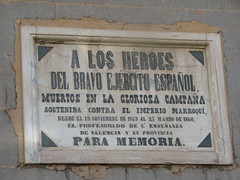 who do the validation are themselves endlessly seeking activities to fill their time. And while it’s easy to agree with cultural norms that, “yes, there’s no arguing that FarmVille is a mighty pointless time-waster,” through a bit of deductive logic it can be proven that, fundamentally, every other human endeavor, be it sleeping, eating, working, painting, praying, politics, war, genocide, love, or rambling semi-incoherent philosophical mumbo-jumbo on a niche roller coaster blog, are all only distractions for us to pass the time between birth and death. People don’t like this, so the argument for a God or other metaphysical goal will be one of the premises needed to make the concept of ‘intrinsic meaning’ attached to these activities logically cognizant, but then again God’s been dead and decomposing for well over a century by now (
who do the validation are themselves endlessly seeking activities to fill their time. And while it’s easy to agree with cultural norms that, “yes, there’s no arguing that FarmVille is a mighty pointless time-waster,” through a bit of deductive logic it can be proven that, fundamentally, every other human endeavor, be it sleeping, eating, working, painting, praying, politics, war, genocide, love, or rambling semi-incoherent philosophical mumbo-jumbo on a niche roller coaster blog, are all only distractions for us to pass the time between birth and death. People don’t like this, so the argument for a God or other metaphysical goal will be one of the premises needed to make the concept of ‘intrinsic meaning’ attached to these activities logically cognizant, but then again God’s been dead and decomposing for well over a century by now (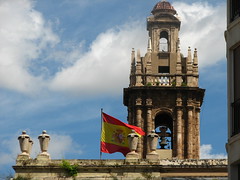 not that this will stop certain Tea Party candidates from invoking Him as a reason to abstain from one of the greatest time-passing activities known to men).
not that this will stop certain Tea Party candidates from invoking Him as a reason to abstain from one of the greatest time-passing activities known to men).
This was the situation I found myself in when I stepped off the Renfe train and onto the platform in Estación del Norte in Valencia, Spain around 9:45am. You see, by some extremely surprising metaphysical disturbance, visiting theme parks happens to be the only activity in the universe to have intrinsic meaning, and as today would be a non-park day for me, the crushing emptiness of existence facing this void of time between Terra Mítica and PortAventura became manifest. When planning my trip I had an extra day to kill so I decided to murder in Valencia, a city I chose because it had the biggest dot on Google Maps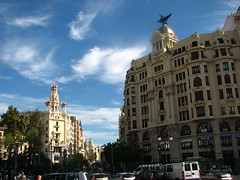 on the coast between Alicante and Salou. Otherwise I knew nothing about it save for a printout page of top activities and a black-and-white city map. Part of me was questioning why I felt compelled to wake so early to partake in filling my temporal gap, especially when my accommodations the previous night in Alicante had been plenty difficult to track down, and the advertised “free wireless internet in all the rooms” was not so strong that I didn’t
on the coast between Alicante and Salou. Otherwise I knew nothing about it save for a printout page of top activities and a black-and-white city map. Part of me was questioning why I felt compelled to wake so early to partake in filling my temporal gap, especially when my accommodations the previous night in Alicante had been plenty difficult to track down, and the advertised “free wireless internet in all the rooms” was not so strong that I didn’t 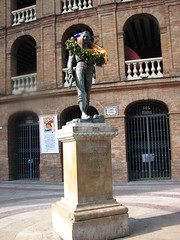 need to sit in the stairwell near the lobby with my computer to make the rest of my necessary plans for the next few days (for those that want to keep score, I’m 0 for 2 for accessible internet in Spain).
need to sit in the stairwell near the lobby with my computer to make the rest of my necessary plans for the next few days (for those that want to keep score, I’m 0 for 2 for accessible internet in Spain).
The first sight I encountered when outside the station was the Plaza de Toros. Oh cool, my first Spanish bullfighting arena! I stop to take some pictures, there’s really not much to see on a weekday morning. I walk over to Plaza Ayuntamiento, where some fountains and statues were to be found beneath the trees. I circled the area once to be sure I hadn’t missed any statues of unfamous people, and then moved on. Apartments and commerce surrounding these plazas offered little touristic value… perhaps not all cities are the best place to spend a day if leisure, not labor, is the primary activity to keep one distracted until death.
is the primary activity to keep one distracted until death.
Further into the city center yielded a few more interesting results, such as the Plaza del Mercado and Plaza de la Virgen, which pleased my sensibilities as they seemed very historic and Spanish, which was what I paid to be there for. Damned if I knew what the actual cultural or historic value to the cathedrals and monuments surrounding these public squares were, but I felt as though I were in the immediate presence of something foreign, and this gave my ego an adrenaline shot. With greater distances and obscurity come greater expenses, and therefore a greater market value is achieved especially when it is highly differentiated (in this case the value is my personal phenomenological experience,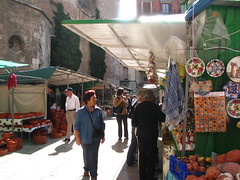 essentially the same thing as every other product you can buy). Each florally painted plate and chipped clay wall belonging to a church that passes by my gaze increased my value of worldliness by that much more of a factor. The people around me all have a slightly darker skin color and speak a different language, how strange is that? To me they’re all foreigners, an exotic commodity if I could take them home to Michigan. But to them, I’m the foreigner. I’m sure if we could speak to each other they would impressed and humbled to be in the company of someone who traveled from such a fantastic distance to be there, in much the same way I am humbled by the many Chinese students who ride the bus on the way to my classes. This is the importance of travel, because for all parties involved it is more valuable to be in the presence
essentially the same thing as every other product you can buy). Each florally painted plate and chipped clay wall belonging to a church that passes by my gaze increased my value of worldliness by that much more of a factor. The people around me all have a slightly darker skin color and speak a different language, how strange is that? To me they’re all foreigners, an exotic commodity if I could take them home to Michigan. But to them, I’m the foreigner. I’m sure if we could speak to each other they would impressed and humbled to be in the company of someone who traveled from such a fantastic distance to be there, in much the same way I am humbled by the many Chinese students who ride the bus on the way to my classes. This is the importance of travel, because for all parties involved it is more valuable to be in the presence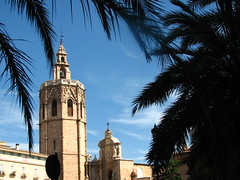 of something from ‘there’ rather than ‘here’. Plus, travel helps pass the time.
of something from ‘there’ rather than ‘here’. Plus, travel helps pass the time.
Eventually I needed to eat a lunch, so I circled the same block competitively pricing each and every food vendor. I discovered two things about food in the tourist sector of Valencia. 1): If you buy nothing, it will be overpriced. 2): As each additional unit of culinary and gastronomic value increases linearly, the marginal level of overpricedness relative to that value will increase exponentially. As I was on a budget and needed to be the bargain hunter, I bought nothing, which by my calculus was the best value around. Although I didn’t spend any money, which was scarce, I did end up spending a half hour, which I had more than enough of to throw to the wind and needed to get rid of anyway.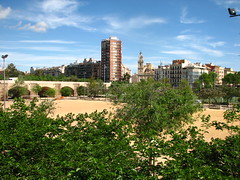
A defining feature of many cities are the river that runs through it. What would Paris be without the Seine, London without the Thames, Rome without the Tiber, or Vienna without the Danube? Spain’s major metropolises seems to be conspicuously absent of any notable flowing body of water, but Valencia at least made up for it with a lengthy parkground called the Jardines del Turia with a few major bridges built over it that flows around the upper edge of the old city extending quite a ways inland from by the coast, and was my next selection to explore. I didn’t have too much exciting to report on other than grass, trees, benches and the occasional sports field, but it did at least take a significant amount of time to walk from one end to the next. Plus I eventually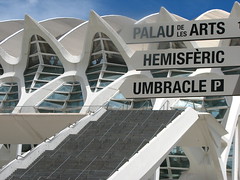 stopped and splurged on lunch at a vending machine I found because I was about to faint from carrying my backpack around all afternoon without having eaten anything since the previous night. And for some reason “Robb Alvey of Theme Park Review” thinks I’m cheap…
stopped and splurged on lunch at a vending machine I found because I was about to faint from carrying my backpack around all afternoon without having eaten anything since the previous night. And for some reason “Robb Alvey of Theme Park Review” thinks I’m cheap…
Hitching a bus, I stepped off in front of a little treat Valencia’s taxpayers had to offer me, a gigantic modern complex debuting in phases between 1998 and 2005 named La Ciudad de las Artes y las Ciencias (The City of the Arts and the Sciences). Four buildings make up this complex, Palau de les Arts Reina Sofía (Palace of the Fine Arts, the large opera house), L’Hemisferic (an Omnimax dome), Museo de las Ciencias (Science Museum), L’Oceanogràfic (a sea life park). I bought a combo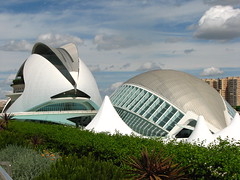 ticket to the museum and Omnimax, but not before exploring the outside of the buildings first. To say the least, they were impressive.
ticket to the museum and Omnimax, but not before exploring the outside of the buildings first. To say the least, they were impressive.
I don’t think I’ve ever seen a public facility quite to this scale, at least not for a purely cultural endeavor and not since the time of the ancient Romans. It was impressive to consider from many perspectives, from the sheer amounts of human labor and natural resources, from the unity of vision over such a large complex, to just looking up at the nose of the Fine Arts Palace and thinking “that is a big building”. The large expanses of smooth, white surfaces make defects stand out like a sore thumb, but save for some dirt gathered in the pools surrounding the buildings they kept it in tip-top shape. I thought I detected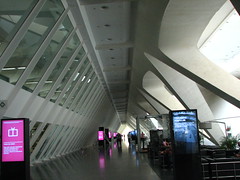 a faint flavoring of fascism in its vision, however, as it was grandiosity and a perfection of design to a nearly obsessive degree, and it would be necessary to walk upwards of a mile just to get around the buildings, which consisted of a lot of giant, empty corridors where the sounds of clicking shoe soles acted as an efficient sonar detection of any other human beings that might be at the other end of the building.
a faint flavoring of fascism in its vision, however, as it was grandiosity and a perfection of design to a nearly obsessive degree, and it would be necessary to walk upwards of a mile just to get around the buildings, which consisted of a lot of giant, empty corridors where the sounds of clicking shoe soles acted as an efficient sonar detection of any other human beings that might be at the other end of the building.
Anyway it proved to be a good way to pass a significant amount of time. The Omnimax show was one of those typical Imax nature documentaries where the narrator is required to have an African accent and a case for conservation is made by appealing to the white suburban audience’s appreciation of really cool and/or weird animals. Never mind that most of the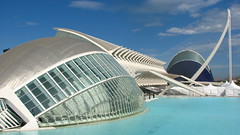 damaging pollution we’re told we should stop doing is caused by third-world nations who don’t have the luxury of a sanitation system and are barely able to turn a gross national product capable of feeding its own population while the rest of the first-world nations strip them of valuable natural resources for meagers to keep the construction costs of things like la Ciudad de las Artes y las Ciencias attainable; such problems are solved by films that promote ‘educational’ eco- and poverty-tourism to pump money into these regions under the tagline “see them now before they die forever!” The kids all loved it.
damaging pollution we’re told we should stop doing is caused by third-world nations who don’t have the luxury of a sanitation system and are barely able to turn a gross national product capable of feeding its own population while the rest of the first-world nations strip them of valuable natural resources for meagers to keep the construction costs of things like la Ciudad de las Artes y las Ciencias attainable; such problems are solved by films that promote ‘educational’ eco- and poverty-tourism to pump money into these regions under the tagline “see them now before they die forever!” The kids all loved it.
The Museo de las Ciencias felt like it should have had a few more exhibits than its massive skeleton-like exterior promised. Undoubtedly they suffered a similar problem as when one moves from a 1-bedroom apartment to a 4-bedroom house for the first time, not enough stuff spread too thinly. There was still plenty to see and do, including a special exhibit on Marvel comics where the scientific relevance is still in question, numerous exhibits dedicated to topics such as genetics, evolution, space exploration, modern engineering and the history of science. One of their top-billed exhibits was a large Foucault’s Pendulum suspended from the roof, a device normally used to measure the earth’s rotation, but this one augmented to also tell time with wooden blocks positioned around the outside edge such that it cause another to tumble every fifteen minutes or so. Time never seemed to pass as slowly as when watching a massive pendulum weight with a lethargic period every ten seconds or so inch closer and closer to ticking off a new hour without ever seeming to get there. Will the waiting ever be over?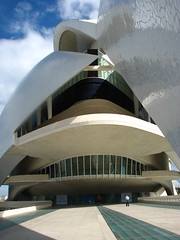
But maybe I’ve been thinking about time the wrong way all along. It should seem fairly obvious that time is independent of one’s own psychological measuring of it. Someone who sits and holds their breath for sixty seconds will probably experience that period of time more slowly than someone who’s rushing to finish their work one minute before the deadline, yet once that end arrives it would be difficult to argue that the breath-holder arrived at that moment (even defined subjectively) ‘after’ the procrastinator. This does run contrary to some conventional ways we think about time. It would conclude that we can’t claim that someone born in 1970 would experience the same moment same moment of their life in 1990 that someone born in 1980 would experience in 2000; at any moment we’re all the same age but at different states of bodily development and degeneration. That seems an alienating prospect, especially when we consider people dead before we were ever born; there would seem to be nothing in common with two such people whatsoever, despite a record of shared life experiences.
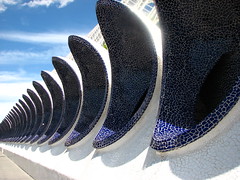 A far more radical conception of how to understand time has been proposed to me by modern physics, a concept I first read about around this time but took me several months later before it finally ‘clicked’ in my head. Relatively talks of space-time as a singular entity, such that if given the ability to step outside it there wouldn’t be any real distinction between “up and down” and “past and present”. This is insanely impossible to visualize from within, but I’ll try to describe what this means for our conception of time (at least how I understand it).
A far more radical conception of how to understand time has been proposed to me by modern physics, a concept I first read about around this time but took me several months later before it finally ‘clicked’ in my head. Relatively talks of space-time as a singular entity, such that if given the ability to step outside it there wouldn’t be any real distinction between “up and down” and “past and present”. This is insanely impossible to visualize from within, but I’ll try to describe what this means for our conception of time (at least how I understand it).
When thinking of time it’s normal to imagine that somehow that fleeting moment of the immediate present is suddenly more real than any other moment, only to flicker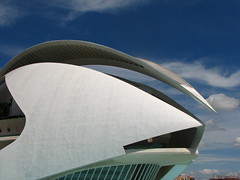 out of existence and be replaced with another flash of reality, and so on. Abandon this conception. Every point in time, past, present, and future, is happening ‘now’. When thinking of the universe, remove one of the space dimensions and replace it with time. It looks the same, every point inside it is there at once as being ‘real’, but when you move along it instead of seeing a length of string formed from individual particles connected over space, you see a length of string formed from one particle stretched out over time. What does this mean for our own experience of time? It means that you’re already dead and have yet to be born. All moments of your life are happening as you read this words, it’s just that the brain state you have access to at any single point in space-time can only ‘see’ what’s immediately in front of it and decides that it’s more real
out of existence and be replaced with another flash of reality, and so on. Abandon this conception. Every point in time, past, present, and future, is happening ‘now’. When thinking of the universe, remove one of the space dimensions and replace it with time. It looks the same, every point inside it is there at once as being ‘real’, but when you move along it instead of seeing a length of string formed from individual particles connected over space, you see a length of string formed from one particle stretched out over time. What does this mean for our own experience of time? It means that you’re already dead and have yet to be born. All moments of your life are happening as you read this words, it’s just that the brain state you have access to at any single point in space-time can only ‘see’ what’s immediately in front of it and decides that it’s more real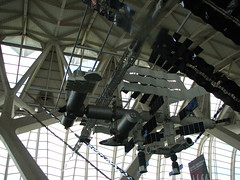 than what’s beyond the scope of your vision, in much the same way that it sees this computer screen as being more real than Bangladesh (although we don’t question if it exists at that moment because we’re not so solipsistic to believe that objects in space only really exist when we see them; thus the same should be true when thinking of space-time). This is to say that at a certain point in space-time a brain state will have immediate sense data of certain things, and hold a memory of what the most recent past was, and this is vaguer and filed in a different way the ‘further way’ we are from it. But the flow of time is only from our perspective as all of these brain states have an organizational structure of memories across the plane of space-time that makes the movement of time an ‘optical illusion’ as it were. Each memory claims a certain moment
than what’s beyond the scope of your vision, in much the same way that it sees this computer screen as being more real than Bangladesh (although we don’t question if it exists at that moment because we’re not so solipsistic to believe that objects in space only really exist when we see them; thus the same should be true when thinking of space-time). This is to say that at a certain point in space-time a brain state will have immediate sense data of certain things, and hold a memory of what the most recent past was, and this is vaguer and filed in a different way the ‘further way’ we are from it. But the flow of time is only from our perspective as all of these brain states have an organizational structure of memories across the plane of space-time that makes the movement of time an ‘optical illusion’ as it were. Each memory claims a certain moment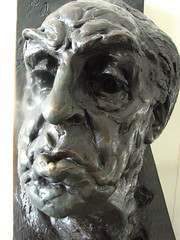 to be the ‘now’ and with a collection of not-quite real memories that seem to represent a moment from the not-quite real anymore past. Bundle these memories together and they seem to flow like a flipbook, but one look at the book itself reveals it all to be at once real. Due to a little caveat known as entropy our brains lack the organizational structure to see into the future (the discussion on entropy and how it seems to give time a forward flow was a whole other chapter in the book I read on the subject; The Fabric of the Cosmos by Brian Greene if anyone wants to read more).
to be the ‘now’ and with a collection of not-quite real memories that seem to represent a moment from the not-quite real anymore past. Bundle these memories together and they seem to flow like a flipbook, but one look at the book itself reveals it all to be at once real. Due to a little caveat known as entropy our brains lack the organizational structure to see into the future (the discussion on entropy and how it seems to give time a forward flow was a whole other chapter in the book I read on the subject; The Fabric of the Cosmos by Brian Greene if anyone wants to read more).
I think I’ve just about wasted enough time that I don’t need to get into discussions about implications for free-will or how a full understanding of physical laws would render ‘anxiety towards death’ as identical to ‘anxiety towards birth’. My time spent trying to fill time with activities to make the time pass easier as I watched time go by had finally reached their end, and I was on a train to Salou for my first day at PortAventura. Just before getting off a friendly woman in her early thirties asked me a question in Castilian, to which I stumbled through “um, non- no hablo español…?”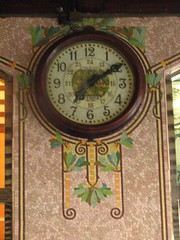 Upon revealing that she spoke English and I wouldn’t have understood if I was more proficient in Spanish anyway, and then discussing our respective reasons for travel to Salou, she offered if I needed to stay at a friend’s house. I had to turn down the offer as I already had a hotel but upon her apologies I insisted it was by far the kindest gesture I’ve experienced by anyone in Spain; it’s just I don’t normally think it the wisest of travel planning to wait to find a place to stay for the night until meeting a total stranger five minutes before we’re to arrive in town. Perhaps I should have considered the reservation a sunk cost and taken the offer; it undoubtedly would have made the evenings far more interesting and culturally enriching, and as I was to shortly discover, once again a Spanish accommodation that advertised free wireless internet in all the rooms could only actually get a connection in the lobby (for those still playing, that’s 0 for 3). Once my battery ran out I spent the rest of my night distracting myself by looking for patterns in the plaster drips on the ceiling.
Upon revealing that she spoke English and I wouldn’t have understood if I was more proficient in Spanish anyway, and then discussing our respective reasons for travel to Salou, she offered if I needed to stay at a friend’s house. I had to turn down the offer as I already had a hotel but upon her apologies I insisted it was by far the kindest gesture I’ve experienced by anyone in Spain; it’s just I don’t normally think it the wisest of travel planning to wait to find a place to stay for the night until meeting a total stranger five minutes before we’re to arrive in town. Perhaps I should have considered the reservation a sunk cost and taken the offer; it undoubtedly would have made the evenings far more interesting and culturally enriching, and as I was to shortly discover, once again a Spanish accommodation that advertised free wireless internet in all the rooms could only actually get a connection in the lobby (for those still playing, that’s 0 for 3). Once my battery ran out I spent the rest of my night distracting myself by looking for patterns in the plaster drips on the ceiling.
Time moved very slowly.
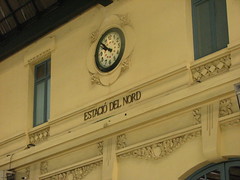
Comments